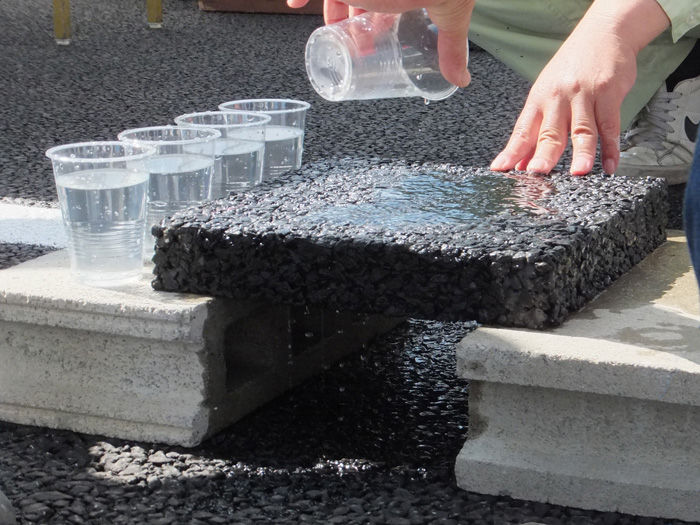Eco-friendly pavement may fortify longevity of pathways
Water filtering through pavement is demonstrated with a square of permeable material. Water infiltrating instantaneously helps reduce runoff.
November 17, 2015
A group of WSU students and faculty are working with Boeing and the Washington Stormwater Center to pave the way toward environmentally friendly roads and walkaways.
The group’s goal is to create a tougher permeable pavement able to withstand heavy traffic loads and still have the same filtering qualities as the traditional versions. Traditional permeable pavement does not wear well and can therefore not be used on roads such as highways.
According to John Stark, director of the Washington Stormwater Center, permeable pavement includes pervious concrete and porous asphalt.
“You can pour water over it and it infiltrates directly which in turn reduces runoff,” Stark said.
Stark is an ecotoxicologist, meaning he studies the effects of toxic chemicals on biological organisms. Part of his research will include testing water that has been through the new permeable pavement and the old to test the toxicity and environmental impact on aquatic organisms.
“If we find that this new form of permeable pavement removes the same or greater amount of pollution and is stronger, that would have a major environmental impact,” Stark said. “We are very excited to help with this project.”
Permeable pavement has been identified by the Environmental Protection Agency as a positive step toward reducing stormwater issues in Washington State. Additionally, the Washington State Department of Ecology’s Water Quality Program has recently created low impact development, or Green Stormwater Infrastructure (GSI) standards which permeable pavement achieves.
Boeing is supporting the project through a $212,000 research grant and donation of cured carbon fiber composite material.
Karl Englund is an associate research professor with the department of civil and environmental engineering (CEE) at WSU. Along with numerous graduate, post-doctoral and undergraduate students, Englund is taking the cured carbon fiber and creating a nontraditional form of permeable pavement.
“There is a very big push towards a more environmentally friendly city landscape,” Englund said.
The CEE is responsible for creating samples and testing their wear resistance, absorption and porosity. They are working on a quick deadline as they are trying to provide a proof of concept by late December.
“Water is one of our most precious resources, and we need to treat it as such,” stated Ursula English, vice president of Boeing Environment, Health & Safety, in a press release from the Boeing communications department.
“We are pleased to provide recyclable composite material from our production line to assist in this vital and innovative research,” she stated in the press release. “Creating the opportunity to expand the use of permeable pavement is good for the environment and the communities in which we live and work.”




















